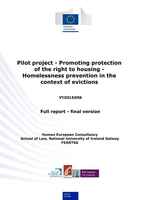European Union: The first report on homelessness and evictions
"Homelessness prevention in the context of evictions": full report - final version
Home is associated with safety, belonging, esteem and personal and child development. Housing and home are intertwined with health, poverty or wealth and opportunity in general. Eviction involves the involuntary removal of people from their homes, with many negative personal and social consequences, particularly for children.
In EU Member States where evictions are widely concentrated among people with complex support needs (mostly in Northern European Member States), research shows that about one quarter of those evicted can become homeless.
This study was undertaken for the European Commission Directorate-General for Employment, Social Affairs & Inclusion as part of the ‘Promoting protection of the right to housing - Homelessness prevention in the context of evictions’ pilot project.
The key objectives of the research were: to provide an overview and analysis of available data and trends regarding housing evictions between 2010 and 2013 across the 28 EU Member States; to establish the reasons for and impacts of eviction, in particular the relative importance of eviction as a pathway into homelessness; to analyse the legislative and regulatory framework and the availability, effectiveness and cost-efficiency of measures designed to prevent and tackle evictions and enable early interventions; to suggest ways to improve data collection and the monitoring of evictions in the Member States, identifying the most important data sources; to formulate recommendations based on best practices to better prevent and tackle evictions and homelessness resulting from evictions.
Commentaires
%login_link_starAuthentifiez vous ou créez un nouveau compte utilisateur pour commenter.

